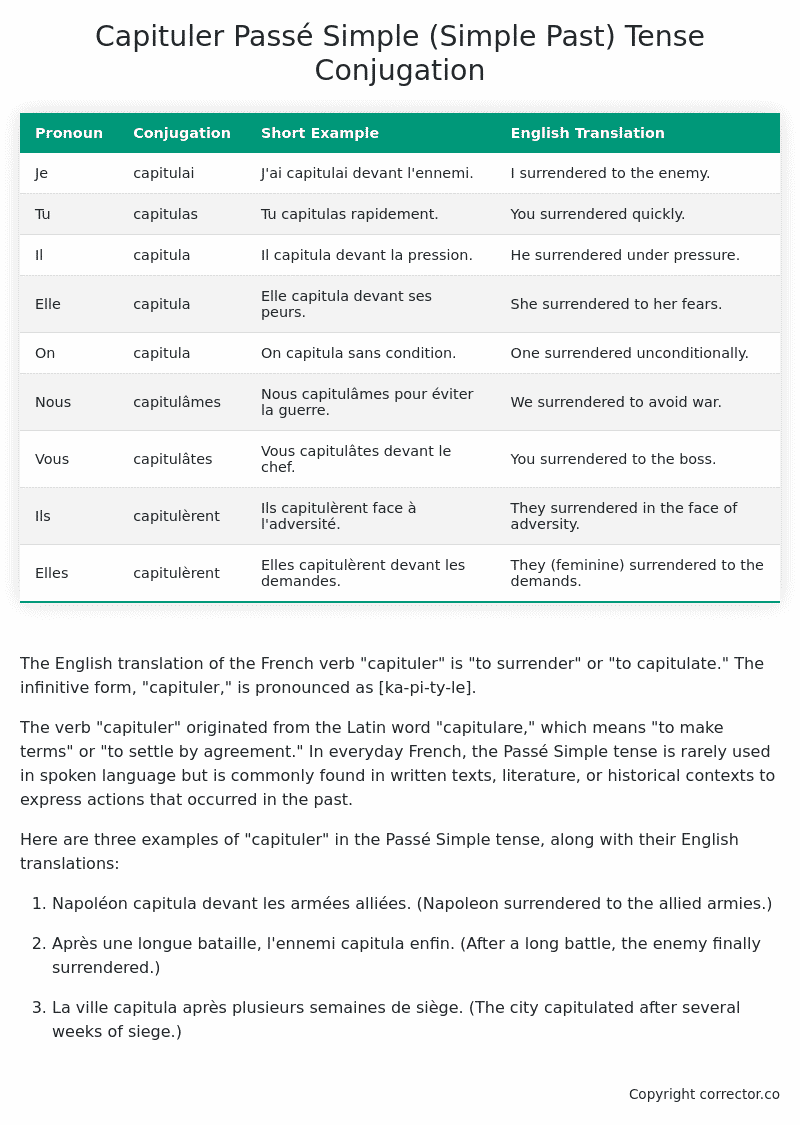Passé Simple (Simple Past) Tense Conjugation of the French Verb capituler
Introduction to the verb capituler
The English translation of the French verb “capituler” is “to surrender” or “to capitulate.” The infinitive form, “capituler,” is pronounced as [ka-pi-ty-le].
The verb “capituler” originated from the Latin word “capitulare,” which means “to make terms” or “to settle by agreement.” In everyday French, the Passé Simple tense is rarely used in spoken language but is commonly found in written texts, literature, or historical contexts to express actions that occurred in the past.
Here are three examples of “capituler” in the Passé Simple tense, along with their English translations:
-
Napoléon capitula devant les armées alliées.
(Napoleon surrendered to the allied armies.) -
Après une longue bataille, l’ennemi capitula enfin.
(After a long battle, the enemy finally surrendered.) -
La ville capitula après plusieurs semaines de siège.
(The city capitulated after several weeks of siege.)
Table of the Passé Simple (Simple Past) Tense Conjugation of capituler
| Pronoun | Conjugation | Short Example | English Translation |
|---|---|---|---|
| Je | capitulai | J’ai capitulai devant l’ennemi. | I surrendered to the enemy. |
| Tu | capitulas | Tu capitulas rapidement. | You surrendered quickly. |
| Il | capitula | Il capitula devant la pression. | He surrendered under pressure. |
| Elle | capitula | Elle capitula devant ses peurs. | She surrendered to her fears. |
| On | capitula | On capitula sans condition. | One surrendered unconditionally. |
| Nous | capitulâmes | Nous capitulâmes pour éviter la guerre. | We surrendered to avoid war. |
| Vous | capitulâtes | Vous capitulâtes devant le chef. | You surrendered to the boss. |
| Ils | capitulèrent | Ils capitulèrent face à l’adversité. | They surrendered in the face of adversity. |
| Elles | capitulèrent | Elles capitulèrent devant les demandes. | They (feminine) surrendered to the demands. |
Other Conjugations for Capituler.
Le Present (Present Tense) Conjugation of the French Verb capituler
Imparfait (Imperfect) Tense Conjugation of the French Verb capituler
Passé Simple (Simple Past) Tense Conjugation of the French Verb capituler (You’re reading it right now!)
Passé Composé (Present Perfect) Tense Conjugation of the French Verb capituler
Futur Simple (Simple Future) Tense Conjugation of the French Verb capituler
Futur Proche (Near Future) Tense Conjugation of the French Verb capituler
Plus-que-parfait (Pluperfect) Tense Conjugation of the French Verb capituler
Passé Antérieur (Past Anterior) Tense Conjugation of the French Verb capituler
Futur Antérieur (Future Anterior) Tense Conjugation of the French Verb capituler
Subjonctif Présent (Subjunctive Present) Tense Conjugation of the French Verb capituler
Subjonctif Passé (Subjunctive Past) Tense Conjugation of the French Verb capituler
Subjonctif Imparfait (Subjunctive Imperfect) Tense Conjugation of the French Verb capituler
Subjonctif Plus-que-parfait (Subjunctive Pluperfect) Tense Conjugation of the French Verb capituler
Conditionnel Présent (Conditional Present) Tense Conjugation of the French Verb capituler
Conditionnel Passé (Conditional Past) Tense Conjugation of the French Verb capituler
Conditionnel Passé II (Conditional Past II) Tense Conjugation of the French Verb capituler
L’impératif Présent (Imperative Present) Tense Conjugation of the French Verb capituler
L’impératif Passé (Imperative Past) Tense Conjugation of the French Verb capituler
L’infinitif Présent (Infinitive Present) Tense Conjugation of the French Verb capituler
L’infinitif Passé (Infinitive Past) Tense Conjugation of the French Verb capituler
Le Participe Présent (Present Participle) Tense Conjugation of the French Verb capituler
Le Participe Passé (Past Participle) Tense Conjugation of the French Verb capituler
Struggling with French verbs or the language in general? Why not use our free French Grammar Checker – no registration required!
Get a FREE Download Study Sheet of this Conjugation 🔥
Simply right click the image below, click “save image” and get your free reference for the capituler Passé Simple tense conjugation!

Capituler – About the French Passé Simple (Simple Past) Tense
Formation
Usage
Narration
Historical Context
Interactions with other tenses
Passé Composé
Imparfait
Conditional and Subjunctive
Summary
I hope you enjoyed this article on the verb capituler. Still in a learning mood? Check out another TOTALLY random French verb conjugation!


